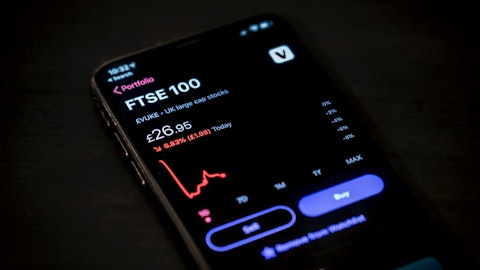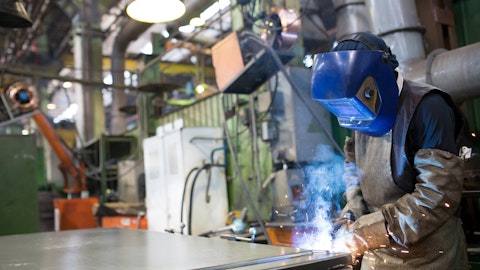Joseph Hayek: Sure. So that business, and we talked about this, there was the large format propane tanks, which is things that would sit outside buildings or be used for construction projects or be used to heat homes. That’s when we talk about mix, those are more expensive products, which is why we talk about a negative mix in the revenue side of things. Saw some destocking there. It started in first quarter, it continued in Q2. We expect that will moderate a bit and we should be, we think, we’ll be through that by the end of Q4. We’ll certainly see some of it in Q3, but it ought to get to where it has historically been. We think by the time we get into the summer months. And so, feel good about that business, just need to get through some of the inventory rightsizing that our customers are going through.
The upside in building products really was being down less than $1 million all in, some really good work on expense management side in addition to the gross margin side. The other end markets that were in there really picked up a lot of slack and we expect and certainly hope that type of activity will continue, which gives us cause for optimism as we head into 2024.
Daniel Moore: Maybe just one more and I’ll jump back out and it’s more of a longer term sort of question on ClarkDietrich specifically. Obviously, as we talked about the last 2 years of that business, exceptionally strong relative to kind of historic levels of profitability and started to normalize a little bit, but just talk about what’s changed in that business over the past few years that gives you confidence that the contribution will remain well above the sort of pre-pandemic levels?
Joseph Hayek: Sure. Clearly, that business has changed in terms of its equity income contribution for us. They’ve done a terrific job of understanding who their customers are, understanding what their customers really value, and that’s being full service, it’s being thoughtful about the entire kind of ecosystem that their customers participate in, not just delivering a load of steel, but helping think about how those connectors and how the other accessories that they sell are important, how they can save contractors’ time, and so, yes, and we’ve talked about this, right. We don’t expect that those results will stay forever or grow forever from where they were in 2022. They moderated some in 2023. We’ve talked about them moderating some in 2024, but long-term, we’re very bullish on that business. They’ve got a great management team. We’re very happy to be a part of that JV.
Operator: [Operator Instructions] Your next question comes from the line of John Tumazos, Very Independent Research.
John Tumazos: Congratulations on the $90 combined value of the two companies with enterprises trading at more than the old Worthington before you announced it. Well done.
Andy Rose: Thank you, John.
Joseph Hayek: Thanks, John.
John Tumazos: I have a question on quarterly dividend set at $0.16 or half of the old company dividend. I thought that was very low. I was in the context of the balance sheet allocation between the two companies where there is almost no net debt in enterprises and you explained how there isn’t very much capital spending need relative to your cash flow where the other company has the preponderance of the net debt and the imminent capital need to find working capital, because steel prices just rose. So in that context, why isn’t the dividend payment larger since the balance sheet is so good? And could you, some people might be concerned, Andy, that you’re not confident in earnings. That’s not really my worry. My worry if you could address is that the balance sheet is super strong and the dividend is low, to save up a half a $0.5 billion or more firepower for a transformational acquisition, we’re above average pot for future acquisitions since you don’t have reinvestment needs.
Andy Rose: I think there’s a question in there somewhere, John, but I’m going to take an attempt here.
John Tumazos: I want to be more blunt. Are you going to make a corporate exchange acquisition? Are you going to transform the company and that’s why the dividend is so low and the balance sheet is so good?
Andy Rose: Well, let me start by saying the past year or so, year and a half has been about working towards the separation and you’ve seen us very purposefully delever the business. We were very focused on maintaining our investment grade credit rating. And you’re correct in that we certainly could pay a larger dividend. I would tell you that, historically we’ve kind of revisited our dividend payout ratio in the June timeframe around that board meeting. And s we go through strategic planning in the spring. We do our operating plans and kind of look at cash flow forecast and those types of things, and that’s where we make those decisions. I will tell you, we do believe that M&A is going to be important part of our growth strategy.
I don’t expect that anytime soon we’re going to do some transformational acquisition that’s going to double the size of the business. That’s not historically what we’ve done. We’ve very much pursued kind of smaller tuck-in acquisitions that we can get our arms around pretty easily and plug them into our Worthington business system and which includes transformation, innovation. And I think that’s likely to be the strategy going forward. We look at a lot of different types of companies. We look at a lot of different sizes of companies, but we’ve had a lot more success buying smaller tuck-ins and really accelerating their growth. So, that’s kind of the plan right now and so I do think as the company continues to grow, we have very high free cash flow for the business, so we can support higher dividends or potentially share buybacks.
But right now, our focus is let’s get the company separated, that’s complete. Let the dust settle and let’s refocus and then kind of figure out what makes the most sense in terms of capital allocation.
John Tumazos: If I could follow-up. With the very successful separation and the stock price Event Enterprise is more than the old stock price of the old Worthington, which maybe in hindsight was really discounted because of the steel volatility contained. Should we expect that buybacks are going to be less of a use of capital going forward, stock price is so successful?
Joe Hayek: As Andy said, we’ll ultimately determine the best capital allocation strategies for the business going forward. We’ve been balanced before. We’ve since been opportunistic when it comes to buyback, but, it will be an arrow in our quiver. And ultimately the board and the management team will decide how best to deploy that.
Operator: There are no further questions at this time. I will now turn the call over back to Andy Rose for some closing remarks.
Andy Rose: Well, thank you everyone for joining us today. It’s exciting time for us and appreciate everybody’s interest in Worthington Enterprises. We wish everybody a terrific holiday season; a safe and happy New Year and we’ll look forward to speaking to you in 2024. Thanks everybody.
Operator: That concludes today’s conference call. You may now disconnect.
Follow Worthington Enterprises Inc. (NYSE:WOR)
Follow Worthington Enterprises Inc. (NYSE:WOR)
Receive real-time insider trading and news alerts




